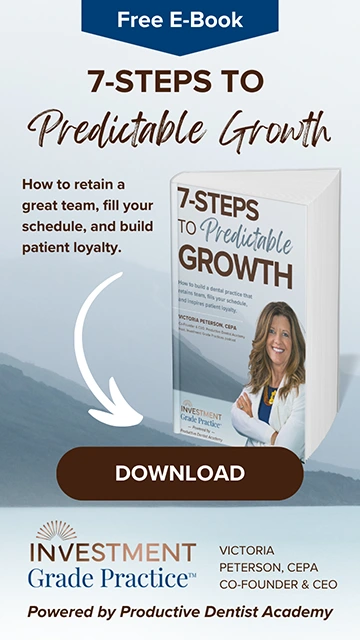A Dental Assistant’s Checklist to Maximize Opportunity
 Great assistants tend to be naturally empathetic and comforting to their patients and spend countless hours honing their clinical skills to be as proficient and efficient as possible. The best assistants take their role in contributing to office productivity and taking amazing care of their patients to a whole new level.
Great assistants tend to be naturally empathetic and comforting to their patients and spend countless hours honing their clinical skills to be as proficient and efficient as possible. The best assistants take their role in contributing to office productivity and taking amazing care of their patients to a whole new level.
Consumer confidence is the number one factor in almost all spending decisions. This could not be more true than in the healthcare field and especially in elective healthcare, aka dentistry. Let’s face it, although those of us in the field would like to believe otherwise, the truth is that as long as there are blenders, teeth (and the dentistry to preserve them) are optional. So creating that confidence and the opportunity to do business as well as effect health, smiles and lives that goes with it, is critical to becoming a top producing office. This is where a motivated assistant, prepared to make the most of every visit for her patients and her team, can make all of the difference.
Let’s highlight four of the most likely portals in a dental assistant’s day to recognize and even create opportunities to enhance the schedule and take even better care of their patients:
Limited exams:
Step one will always be to do your due diligence before taking your patient back.
What is their chief complaint? Are they in pain? Have they been in before? When? For what? Was that resolved? Do they have any unscheduled treatment?
Judging from the patient’s chief complaint combined with information from previous visits (unscheduled treatment, earlier complaints or observations), can you take a good guess at what the issue might be? If your guess is right, are you prepared to explain what their possible treatment options are? Advantages/disadvantages to the different options? Financial options for going forward with treatment? Is there time to get started today? If not today,then when?
Next, be prepared to present and act on what else is possible, if appropriate.
Is there time to make this a comprehensive exam if it is appropriate and the patient agrees? Health history- did they comment on any other concerns or mark that they are unhappy with their smile?
Obviously, if the patient is in severe pain or a big hurry in wouldn’t be prudent to pursue these options at this visit. But that tends to be more the exception than the rule. Give your patients the opportunity to be fully evaluated. The cost ends up being less in the end (one visit instead of two), and it shows your concern to restore their mouth to full health, not just put out fires.
Restorative appointment:
Here again it is back to proper research and preparation. Make it your policy to never walk blindly into an appointment. Even the most mundane, single surface filling appointment can have huge potential if the assistant is prepared and alert. Take no chances in being ‘caught with your pants down’ with patient questions and concerns. It instills confidence when a patient asks a question and the assistant knows the answer, or at least what the patient is talking about. For instance, not having to refer back to the chart when the patient asks about, “the broken tooth on the other side”. A patient wants to know that you know about them and their concerns and conditions.
Consider an appointment for you to the dermatologist to get a mole removed. They see it a hundred times a year, but for you it’s new. You’re nervous and not sure what to expect and, although this mole was the Dr.’s first step, you are also concerned about
When was their last appointment? With who? For what?
What are we doing today? Why (Be prepared to answer questions)? When was it scheduled? Is there a current x-ray?
Do they have other unscheduled treatment? Is it necessary or elective (be prepared to explain/discuss)? Is there time today to do more? Is insurance available? Is their next hygiene appointment scheduled?
Unscheduled time:
*aside from filling it from the opportunities explored above*
Consort with the hygiene department. Do they have any patients that day with unscheduled treatment that might be able to work into the open time?
Let team know in morning huddle to be looking for things to fill that opening (also be looking a day or two out and keep team informed- “I also have a two hour opening Thursday afternoon.”)
Work your unscheduled list (&/or front desk 1-31 file)
**Once the open time is here, you all have a list of ‘to-do’s’ to keep you busy — calls; instruments; charting, etc…. But your job up and to the actual time of that open appointment is to do everything in your power to fill it.
- Waiting for Doc (with your patient)
- Review today’s tx- see if pt. has questions
- Give post-op or at home care/what to expect instructions
- Talk about future/unscheduled treatment
- Take pictures !!
- Relate today’s (or future) tx to risk factors and overall mouth health (ex: today is an extraction- discuss what’s next. Live with space? Bridge? Implant? What is a bridge? What is the process for an implant? What does each option mean for surrounding teeth long term? )
- Talk about Doc’s latest training or office’s latest technology
- If nothing else, just stay with the patient and make small talk. Link with them- kids, job, vacations, etc…
We also discussed hand-offs before Dr. leaves the room and from asst. to front desk. We talked about some strategies for making sure you are getting/giving all of the pertinent information:
Dr. > Dental Assistant
1) As Dr. is tx planning- write down questions you have and make sure you are clear on those before Dr. leaves the room (thinking ahead about helping pt. pick options, phase further tx, etc…).
2) Also consider what questions you would have if you were the patient. If you don’t know the answers to any of those and the pt. doesn’t ask, consider asking the doctor for the pt (because you know they’ll think of it as soon as Dr. walks out of the room- then you’re stuck).
3) For days that seem particularly rushed: Make and post for quick reference a short list (2-3 things) that you must know before Dr. has left the room (ie: what’s next? how soon? order of remaining tx? what is necessary vs. essential? etc…). Be prepared with these questions in hand, be brief and be firm about getting at least these answered.
Dental Assistant > Front
1) Continue to follow REAPP (Review; Educate; Acknowledge; Pre-appt; Pay)- Ahna and Rosie both said that you all are doing a great job.
2) Ask for specific feedback- what can I do more of, better, or differently to help make your job easier?- to continue to improve. Especially after times you felt something was ‘off’ or could have gone better.
Hand-offs are the culmination to all of the rest of the hard work that has been put in previously. It doesn’t matter how awesome a patient experience has been up until that time, if there is lack of communication, mixed messages or miscommunication as they move them toward the next step the red flags go right up, uneasiness sets in and all previous work and time is sabotaged. No matter who else is waiting or how rushed you feel, remember that the person in front of you right here, right now is still here and still needs your full, undivided attention. Finish this job before you move on – physically or mentally. The person that you are rushing to will expect the same once you get there!
Have a great experience with PDA recently?
Download PDA Doctor Case Studies


















